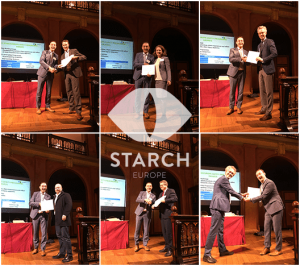Starch Europe announces winners of 2017-2018 Safety Awards
Press Release
EU starch producers are proud to renew their firm commitment to continuously improve safety practices and to achieve a safer working environment, through their contribution to the 4th exercise of the Starch Europe Safety Programme.
The Starch Europe Safety Programme, launched in 2014, recognises the best performing EU starch plants in terms of reducing workplace accidents. This showcases the dedication of companies to maintain efforts to reduce the risk of accidents occurring, through constant exchange of experience and good practices.

The Starch Europe Safety Programme grants two types of awards:
The year award – is awarded to plants which registered no employee lost workday cases involving days away from work for the calendar year, and no employee and no non-employee workplace fatalities for the calendar year.
The million hour award – is awarded to plants which registered 1 million consecutive employee hours without an employee lost workday case and without a workplace-related fatality of an employee or non-employee during that period.
Data is collected on a quarterly basis by PWC from companies participating on a voluntary basis. The collection of this data started from 1 July 2014. PWC ensures the validity and consistency of the data provided and reports on eligible plants for each award.
38 of the 75 starch plants in the EU represented by Starch Europe’s 26 member companies, participated in the safety award scheme from 1 July 2017 to 30 June 2018.
Starch Europe is delighted to announce the following eligible companies to the two Award categories:
Million Hour Award |
|
|---|---|
| COMPANY | PLANT |
| Cargill | Castelmassa - Italy |
| Roquette | Lestrem - France |
Year Award |
|
|---|---|
| COMPANY | PLANT |
| ADM | Amylum – Bulgaria |
| AKV | AKV Langholt – Denmark |
| Cargill | Castelmassa – Italy |
| Cargill | Krefeld – Germany |
| Cargill | Manchester – United Kingdom |
| Ingredion | Goole - United Kingdom |
| Roquette | Benifaió – Spain |
| Roquette | Cassano – Italy |
| Roquette | Corby - United Kingdom |
| Tate & Lyle | Tate & Lyle Boleraz – Slovakia |
| Tate & Lyle | Koog aan de Zaan – Netherlands |
Our congratulations to the winners.
For further information, please contact:
Jamie Fortescue – 00 32 2 289 67 67 – jamie.fortescue@starch.local
About Starch Europe The European starch industry manufactures over six hundred products including native starches, modified starches, liquid and solid sweeteners as well as oils, proteins and fibres that are used as ingredients and functional supplements in a vast array of food, feed and industrial applications.
In 2017, from 75 starch production facilities in 20 of the 28 EU Member States, the European starch industry processed about 24 million tonnes of agricultural raw materials, roughly split between wheat (9 million tonnes), maize (8 million tonnes), and starch potatoes (7 million tonnes) transformed into 11 million tonnes of starch and 5 million tonnes of co-products.
To valorise all the components of the raw materials, the EU starch industry transforms it in a broad range of innovative and traditional starch products and ingredients. In fact, the EU starch industry processes every part of the grain or the tuber and produces minimal waste; more than 99% is valorised . With a turnover of 7.4 billion Euros, it also invested about 429 million Euros, of which over 78 million Euros in Research & Development. The EU consumes 9,4 million tonnes of starch, of which 58% in food, 2% in feed and 40% in industrial applications.

